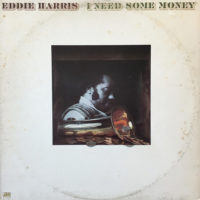
The late American saxophonist/vocalist Eddie Harris is king of the jazz bargain bin, now that Billy Cobham’s catalog is rising in stock. Nearly all of Harris’ albums go for under $10; if you see one from the late ’60s or ’70s, grab it.
Over his prolific career, Eddie Harris was an adept balladeer, bluesman, straight-ahead bop melodicist, funky party-starter, turbulent free jazzer, and experimentalist with a keen interest in the mind-bending properties of electronic effects. I Need Some Money arrived toward the end of funk’s reign and near the beginning of disco’s dominance, and you can hear Harris and his skilled group seeking ingenious ways to move bodies.
That approach is obvious from the opening track. More than anything, “I Need Some Money” resembles the soulful, swerving funk of the O’Jays, early Commodores, and Larry Young’s Fuel. Harris’ lyrics lament the high cost of living, a common theme in black music of the ’70s, and one that’s proved to be timeless. Hell, it’s been my anthem in this messed-up year of unemployment and limited opportunities. The refrain of “Everything is so damn high!” will prance through your brain for hours. “Get On Down” starts with unsettling stomach-hunger sounds (probably created with a quica) and Eddie saying “excuse me.” A tentative beat percolates and about 100 seconds in, the song shifts into an unstoppable jazz-funk groove that bubbles and shimmies like Stevie Wonder’s “Superstitious.” Harris drops in some chuckle-worthy scat singing and Leon Thomas-esque yodeling, adding levity to a track that’s almost too much fun. “Get On Down” is a self-fulfilling prophecy.
Shifting into a sparser, lower key, “Time To Do Your Thing” is an Afro-Latin percussion fest and a dancin’/romancin’ soundtrack for the carnally advanced. Above all the timbrally interesting beats, Harris’ robust, snaky sax (alluding to Wonder’s “Maybe Your Baby”), Bradley Bobo’s lubricious bass, and Ronald Muldrow’s clanging guitar engage in a vivacious conversation. Harris goes on another tangent with “Carnival,” a weirdly festive exotica excursion. It’s powered by the sort of drum-machine beats that would animate many ’80s synthwave groups, with Harris’ sax FX’d into timbres more associated with synthesizers the instrument Bird and Trane made legendary. African whistle, talking drum, cabasa, and massed, jokey chants add to the track’s otherness.
I Need Some Money‘s peak might be the nearly 12-minute “I Don’t Want Nobody.” Sounding like Spirit Of Eden-era Talk Talk over a decade before the fact, the musicians conjure a gospel-tinged blues of somber majesty. Harris sings through an electric sax at the beginning to feminize his voice while Muldrow’s guitorgan whirs into the church-y mode of Spiritualized’s “Shine A Light.” Rufus Reid’s six-string bass and the guitorgan entwine in a lofty dialogue, as the broken-hearted singer licks his wounds. (“You’ve always said that you love me/That I’d be the only one/You thought of me every night/Why did you say we have a future”). Absolutely crushing. (Trivia: Oh Sees’ John Dwyer is a huge fan.) The album ends with “That’s It,” an alternate-world version of Quincy Jones’ Sanford And Son theme—slower, but just as inspirational and grimy.
From what I’ve read, the title of I Need Some Money was the truth. Alas, Harris didn’t score a hit with it, but in his pursuit of lucre, he inadvertently cut his best album of the decade. If it’s a “sell-out” move, it’s akin to Miles Davis’ similar stab at commercial success that resulted in an uncompromising classic: On The Corner. Bonus: Money still commonly dwells in the cheapie bins. -Buckley Mayfield


